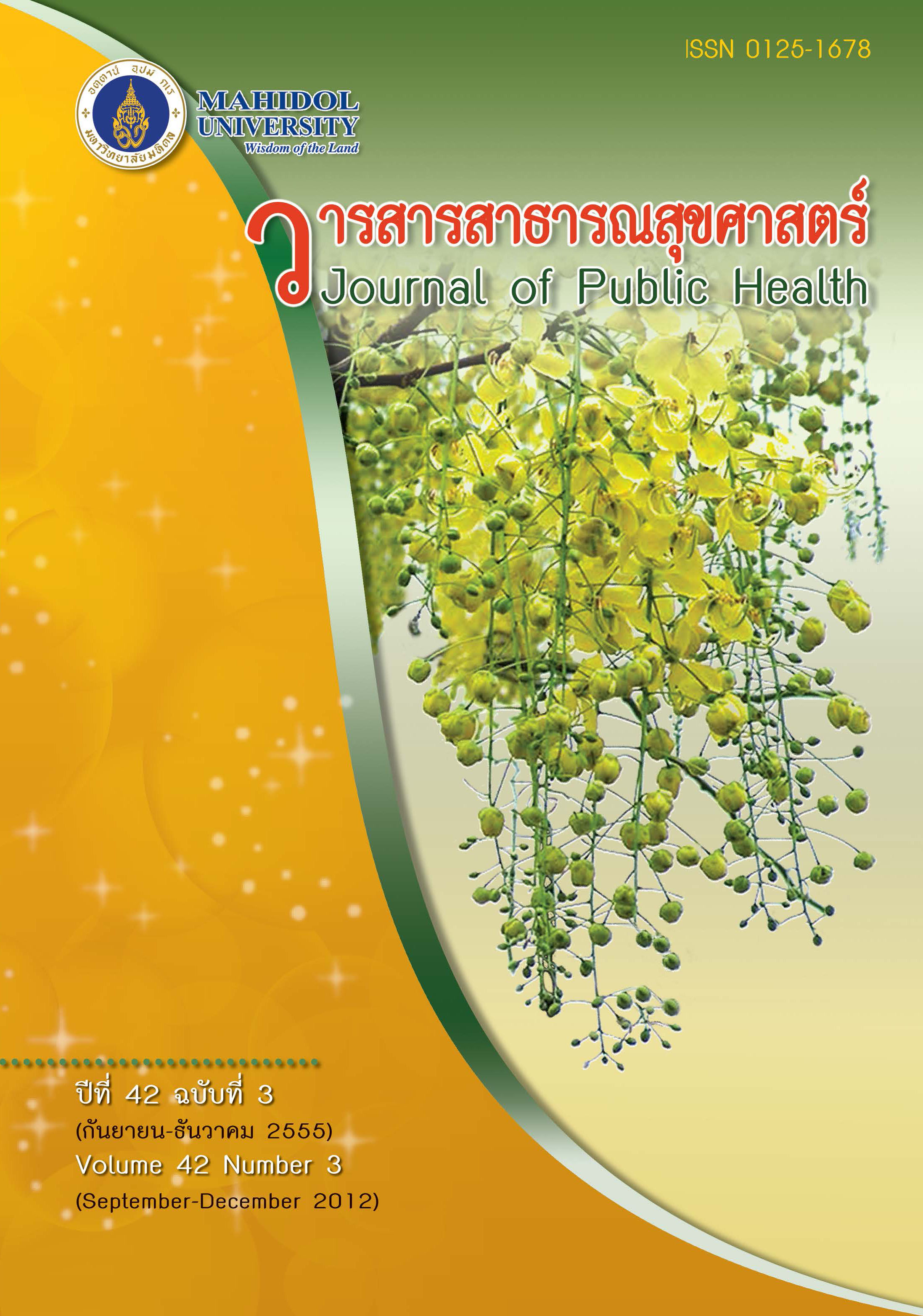การเข้าถึงบริการสุขภาพและพฤติกรรมการดูแลสุขภาพด้านอนามัยเจริญพันธุ์ ของแรงงานข้ามชาติสตรีไทใหญ่
Keywords:
อนามัยเจริญพันธุ์การเข้าถึงบริการสุขภาพ, พฤติกรรมการดูแลสุขภาพ, ไทใหญ่, แรงงานข้ามชาติสตรี, reproductive health, accessibility to health care service, reproductive health care behavior, Shan, female migrant workerAbstract
บทคัดย่อ
การพัฒนาทางเศรษฐกิจอย่างรวดเร็วทำให้ จำนวนแรงงานข้ามชาติสตรีเพิ่มขึ้น โดยเฉพาะใน ภาคเหนือจะเป็นไทใหญ่ แรงงานเหล่านี้มีข้อจำกัด ทางสิทธิกฎหมายโดยเฉพาะแรงงานที่ไม่มีบัตร ประกอบกับความแตกต่างด้านภาษาและวัฒนธรรม จึงอาจก่อให้เกิดปัญหาของการเข้าถึงบริการสุขภาพ ด้านอนามัยเจริญพันธุ์ ส่งผลกระทบต่อภาวะสุขภาพ การวิจัยนี้เพื่อศึกษาการเข้าถึงบริการสุขภาพและ พฤติกรรมการดูแลสุขภาพด้านอนามัยเจริญพันธุ์ของ แรงงานข้ามชาติสตรีไทใหญ่ รวบรวมข้อมูลโดยใช้ แบบสอบถามแบบมีโครงสร้างสัมภาษณ์กับแรงงาน ข้ามชาติสตรีไทใหญ่จำนวน 314 คน และใช้วิธีการ สัมภาษณ์ และการสนทนากลุ่มกับผู้มีส่วนได้ส่วนเสีย รวมจำนวน 48 คน ผลการวิจัยพบว่า สตรีร้อยละ 42.7-55.4 ไม่ทราบถึงบริการด้านอนามัยเจริญพันธุ์ ในแต่ละเรื่องที่มีอยู่ในสถานบริการ ขณะที่ร้อยละ 19.9-41.1 ของสตรีที่ทราบว่ามีบริการ เคยใช้บริการ สุขภาพด้านอนามัยเจริญพันธุ์ในแต่ละเรื่องอย่างน้อย หนึ่งครั้ง โดยส่วนใหญ่กลุ่มตัวอย่างร้อยละ 93.2-97.1 มี ความพึงพอใจในบริการสุขภาพด้านอนามัยเจริญพันธุ์ที่ได้รับ สำหรับอุปสรรคในการรับบริการสุขภาพด้าน อนามัยเจริญพันธุ์ที่สำคัญ ได้แก่ “ลำบากใจที่จะได้รับ การตรวจรักษาจากแพทย์ที่เป็นผู้ชาย” และ “อาย เพราะต้องเปิดเผยอวัยวะที่ควรปกปิด” ดังนั้นเมื่อ สตรีมีปัญหาสุขภาพด้านอนามัยเจริญพันธุ์ สตรีเกือบ ครึ่งหนึ่งซื้อยามารับประทานเอง (41.7%) ตรวจรักษา กับบุคลากรแผนปัจจุบัน (40.4%) และรับการดูแล โดยหมอพื้นบ้าน (17.5%) ผลการวิจัยคณะผู้วิจัยจึง มีข้อเสนอแนะควรมีการพัฒนาระบบการสื่อสาร สุขภาพและการจัดบริการสุขภาพเฉพาะแรงงาน ข้ามชาติสตรี เพื่อแรงงานกลุ่มนี้สามารถเข้าถึงข้อมูล ข่าวสารและบริการสุขภาพได้โดยง่ายและจูงใจให้มี พฤติกรรมอนามัยเจริญพันธุ์ที่ดี
คำสำคัญ: อนามัยเจริญพันธุ์การเข้าถึงบริการสุขภาพ; พฤติกรรมการดูแลสุขภาพ; ไทใหญ่; แรงงานข้ามชาติสตรี
ABSTRACT
Rapid economic development leads to increasing number of female migrants, especially in the North most are Shan. With limitation of legal rights especially the workers are undocumented as well as the differences of language and culture, they might be difficult to access health care services that might be impact on their health. The objectives of this research were to investigate accessibility to health care services and reproductive health care behaviors among female Shan migrant workers by using qualitative and quantitative methods. Data were collected by using a structured questionnaire interviewing with 314 female Shan migrant workers and interviewing and focus group discussions with 48 stakeholders. The results revealed that 42.7-55.4% of the Shan migrant women did not know about each reproductive health service in the hospitals. While 19.9-41.1% of the women, who know about reproductive health services, have accessed the services at least once. Almost of these women, who have accessed these reproductive health care services, were satisfied with the health care services (93.2- 97.1%). The most important obstacle to accessing reproductive health services was ‘feeling uncomfortable at being examined or treated by a male physician’ and ‘feeling ashamed to expose reproductive organs’. Therefore, if they had reproductive health problems, most of them reported that they would self-treat by buying drugs from drug stores (41.7%), visit health care providers (40.4%) and visit by traditional healers (17.5%).
The researchers recommend developing health communication system as well as organizing health care services specifically for female migrant workers in order to easily access for health information and health care services and are motivated to have healthy reproductive health care behavior.
Key words: reproductive health; accessibility to health care service; reproductive health care behavior; Shan; female migrant worker.
Downloads
Issue
Section
License
Creative Commons License CC-BY-ND


